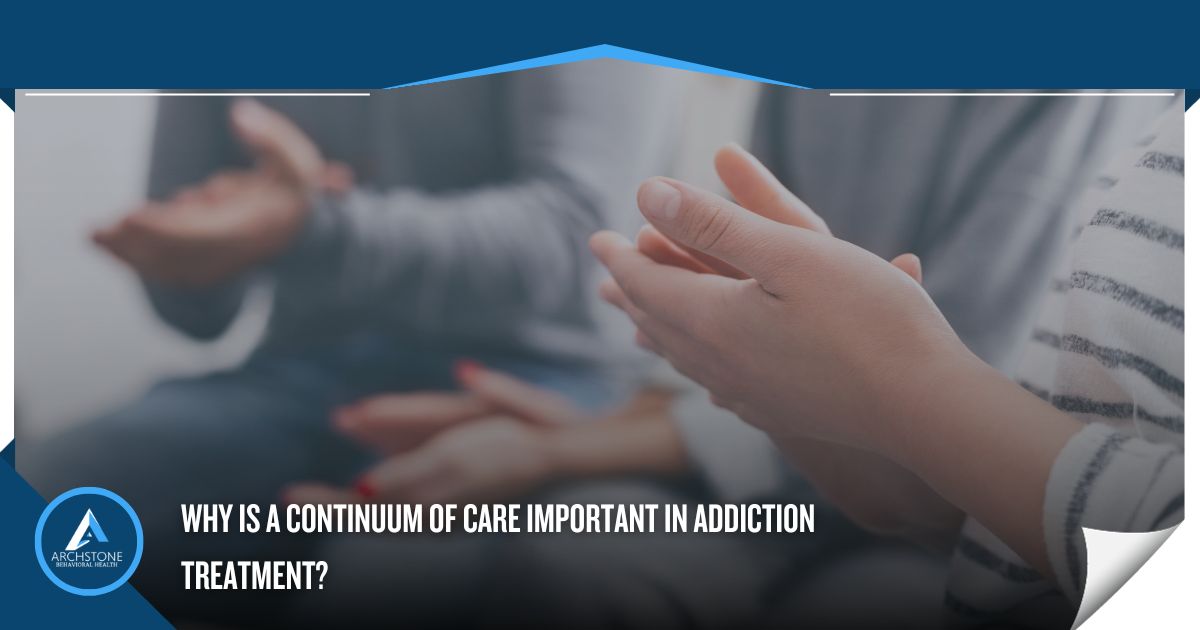Why is a Continuum of Care Important in Addiction Treatment?
Get Help Now

Addiction recovery is a lifelong process–not a final destination. People in recovery must receive tailored, high-quality care and support at every stage. This continuum of care allows people to get the services, therapies, and help they need as they move through the steps of recovery.
The continuum of care is essential during addiction treatment, and finding a treatment center that offers a wide range of programs is critical to your long-term success in recovery. At Archstone Recovery, we provide evidence-based care at all stages of addiction recovery. Reach out to our team of specialists now to learn why the continuum of care is important in addiction treatment or to learn more about our programs.
What is a Continuum of Care?
The term “continuum of care” means continuous care from the very beginning of treatment–typically a detox program–until people complete treatment and begin an aftercare program.
The continuum of care in addiction treatment begins when you recognize that you need help and enter rehab. In most cases, the continuum of care starts with an intensive level of treatment. Then, people move to lower levels of care after they are stabilized and have fewer intensive needs.
One typical example of the continuum of care in addiction treatment would be:
- A person enters a medically-supported detox program.
- After detox, the person begins an intensive inpatient treatment program.
- Once they are stable, they may move to an intensive outpatient program (IOP) or partial hospitalization program (PHP).
- Next, they would move to a less intensive outpatient rehab program.
- Finally, they would access support and resources from the facility as part of their aftercare plan.
Each person has their own needs in recovery and must follow a specialized treatment plan designed just for them.
Before beginning treatment, doctors or addiction specialists evaluate each person’s needs and then create a treatment plan to meet their unique needs. As time passes, the treatment team regularly re-evaluates each person’s needs and adjusts the treatment plan to account for their progress or setbacks.
What Happens in Addiction Treatment?
The continuum of care in addiction treatment can increase a person’s likelihood of being successful in recovery. People require thoughtful, tailored treatments that address the complex physical, emotional, and behavioral roots of substance abuse.
Because people have different treatment needs throughout recovery, several treatment programs are available. People may participate in inpatient rehab programs or receive care on an outpatient basis.
Some of the most common levels of care in addiction treatment include:
- Inpatient or residential treatment
- Partial hospitalization programs (PHP)
- Intensive outpatient programs (IOP)
- Sober living
- Medically-supported detox programs
Treatment plans in every level of care may include:
- Individual counseling
- Behavioral therapies
- Family therapy
- Group therapy
- Relapse prevention education
- Medical treatment
- Mental health treatment
- Coping skills practice
- Medications
- Holistic therapies like nutrition support, exercise, mindfulness, and more
Addiction is a complex condition that requires comprehensive care. Following a continuum of care can help people smoothly transition into other levels of care and programs as they progress in recovery. This allows treatment teams to provide each person with the best treatment and care possible.
What Contributes to a Person’s Success in Recovery?
The continuum of care in addiction treatment helps people get tailored treatment and support at every stage of recovery. Other factors can contribute to people’s success in treatment and recovery, too.
Here are some of the factors that can help people be more successful in recovery.
Stability
Stability can come from a person’s family, friends, and community. It also means having a safe, stable living environment and accessible treatment options.
Adequate time in treatment
People who spend adequate time in treatment tend to have better outcomes and longer-lasting recoveries than people who only participate in detox programs. The continuum of care is essential throughout extended treatment programs because it ensures that people can easily access the care they need and transition into other programs quickly and easily.
Continuing support
People with substance use disorders must find support in the community and social support after completing an addiction treatment program. A continuum of support in addiction treatment often includes aftercare like community resources, additional treatment programs, support groups, and other programs that support lifelong addiction recovery.
Find Help Now
At Archstone Recovery, we understand that professional treatment programs are essential in helping people recover from drug and alcohol addiction, but that people also need support in the community. Our experienced specialists work with families and connect people with the community resources they need at every stage of recovery.
If you or someone you love is struggling with substance abuse or addiction, you are not alone. Reach out to the team at Archstone Recovery now to learn about our high-quality treatment programs or to schedule an intake appointment.